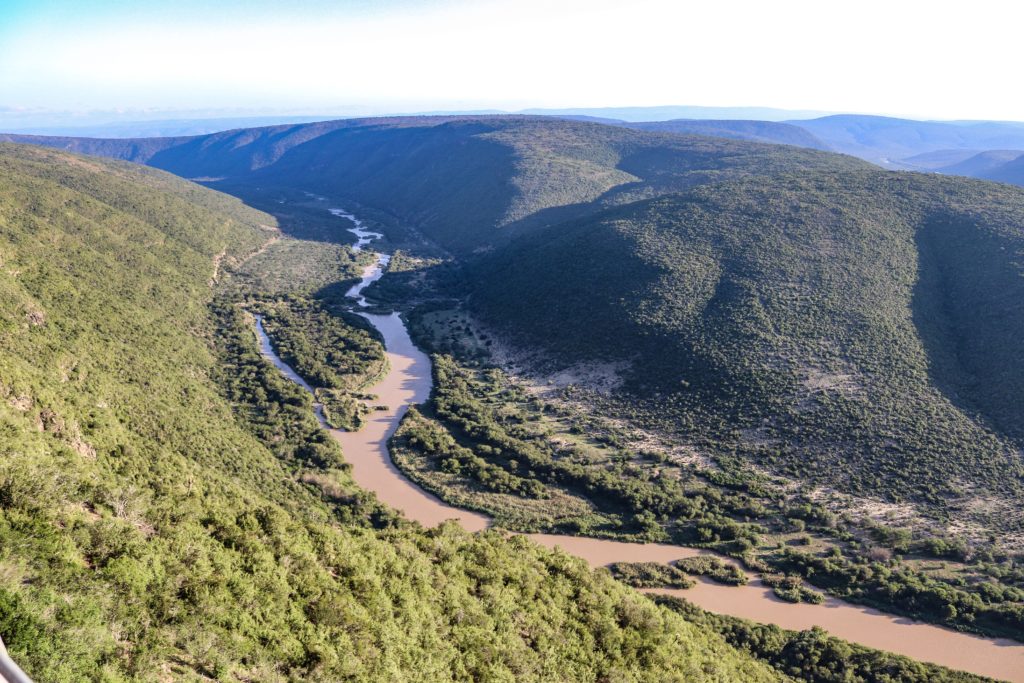The Great Fish River Nature Reserve boasts a wealth of natural resources. From endemic flora and fauna, to untold stories of the area’s cultural heritage, secrets and surprises remain tucked away in the folds of the river valley. Grocott’s Mail visited the reserve as guests of the Eastern Cape Parks and Tourism Agency (ECPTA) during an educational weekend, when we learned more about the park’s conservation successes and challenges.
Solomon Lefoka is the reserve’s Conservation Manager; a true beacon of wisdom and hope when it comes to protecting and growing the park’s biodiversity. Before working at Great Fish, Lefoka spent a number of years at Addo Elephant Park, and shared a story from his time there of pulling a distressed baby elephant out of a dam with his bare hands. With a vibrant personality and smile, Lefoka’s passion for conservation was contagious.
“What I want to strive for is to teach people about our environment and how to protect it. If we don’t take care of what we have now, unfortunately generations to come are the ones who are going to suffer,” said Lefoka.
“A lot of people don’t know about a place until they are there. But what is important is actually for people to know what a reserve, such as Great Fish, can actually offer. “There is a lot out there that can be discovered,” said Lefoka.
The reserve’s Park Manager, Sizwe Mkhulise, emphasised the uniqueness of the area, calling it a biodiversity hot-spot. “There is a special habitat that houses a diversity of rare and endangered species,” he said. “The thicket is well conserved in this area, [and]also the wildlife diversity.”
Mkhulise added that the park also supplied other reserves with species as a result of successful conservation efforts. “The genetic diversity [contributes]to the industry, through game sales and also to other Eastern Cape parks, because we do translocation every year of different animals.” The translocation process helps to establish new populations and spread genetic material, said Mkhulise.
“When it comes to competing with other [private]reserves we will always find ourselves on the back foot,” said Bongani Matshishi, ECPTA’s Brand Manager. “The more information we have, the more we can refine the offering, the more we can increase the knowledge of what is in the reserve and put it out there.
“Our reserves have a dual mandate.” said Matshitshi. “We have to promote tourism in the Eastern Cape – but at the same time we have to manage the biodiversity in the area.
“There are certain things we can’t do, for example there are certain [non-endemic] animals we can’t have in this reserve in order to maintain the natural biodiversity of this place.”
Lefoka emphasised that the reserve was rich in both biodiversity and cultural heritage.
“If we can have university students coming in and doing their research [in those areas], that will assist a long way, and that is what we need. If you don’t know what species are out there, how are you going to be able to manage them? You can’t manage what you don’t know,” he said, emphasising the need for research and data collection as a vital part of conservation.
The Great Fish River Reserve has partnerships with many Eastern Cape universities, NGOs and other non-state actors. These partnerships all serve as an effort to promote and increase research and engagement with the park. Mkhulise encouraged organisations, students and businesses to engage with the reserve on its many opportunities for tourism, eco-tourism and research.
“If we want what we have to last for years and years to come, we need to have the support of not only the locals, but also [international visitors and researchers],” Lefoka said. “As government institutions we struggle a lot in terms of budgets, and if we can get people to come and assist us in conservation, we aren’t going to say no.”
Like many reserves across the country, and the continent, the park’s biggest threat is poaching.
“There is no single golden bullet that can stop poaching,” said Lefoka. “Poaching, whether it’s for subsistence, or the illegal harvesting of medicinal plants… in general [is a big challenge].”
No single approach worked to counter poaching, Lefoka said.
“You have to work with your communities, police, municipalities, schools, intelligence – those are the different important role players.”
Lefoka’s comments came hours after judgment in the historic Ndlovu rhino poaching trial. The gang of three targeted reserves around Makhanda, as well as Cradock, Graaff-Reinet and Jansenville, and during a three-year spree were responsible for the deaths of at least 10 rhinos in the 10 incidents dealt with in this trial.
The conviction was a breakthrough for the country’s biodiversity, animal and environmental activists, and for dedicated reserve staff on the ground, like Lefoka and his team.
For more information about the reserve, visit ECPTA’s website.
The report on the Ndlovu rhino trial starts on page 5 (and is continued below here). Turn to pages 8 and 9 to read more about the Great Fish River Nature Reserve.



